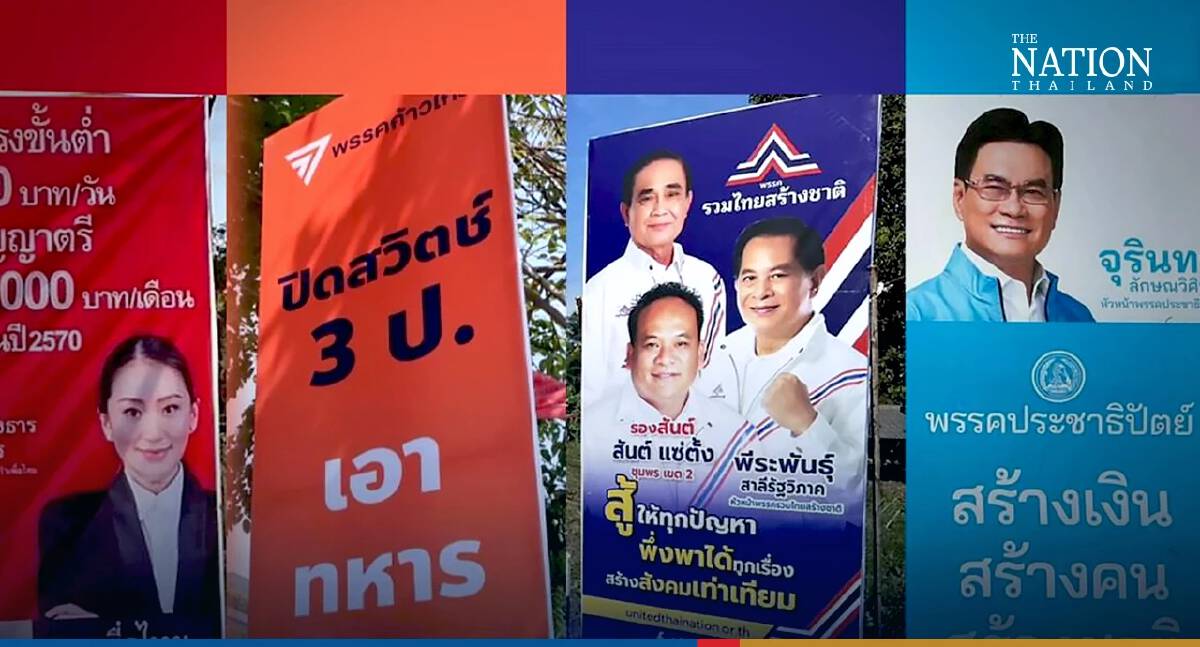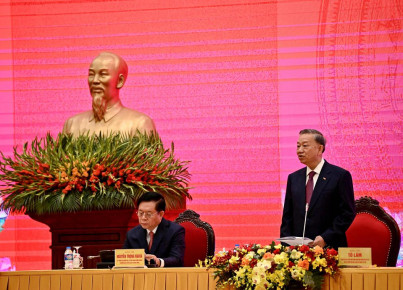Everything is set for Thailand's May 14 elections. Paetongtarn Shinawatra's Pheu Thai dominates in the polls but is unlikely to rule alone, while pro-military parties know they can count on the 250 votes of the unelected senate. Move Forward and Bhumjaithai the most interesting variables, but they will not be "free and fair" elections
Article by Francesco Mattogno
For two decades, elections in Thailand have been held according to an almost identical script. It is expected that the ones set for May 14 will not deviate from it too much either. It will again be a struggle between the Shinawatra family party and parties associated with the conservative, military-linked, pro-monarchist establishment. The Pheu Thai (PTP) - the third name of the Shinawatras' populist party, which has been dissolved twice in the past - won every election from 2001 to 2019, but ruled on and off only as long as the military allowed it to.
Despite two coups (2006 and 2014) and a new constitution written by the military (2017), Pheu Thai remains the country's leading electoral force. The generality of polls ahead of the May 14 elections give it between 46 percent and 49 percent, with its main premier candidate, Paetongtarn Shinawatra, still leading the polls by at least twenty points ahead of the other parties' incumbents. But to win will not be enough.
In Thailand, only the 500 seats in the lower house of parliament are elective, while the 250 seats in the senate (which participates in voting for the prime minister) are military-appointed. A condition provided for ad hoc in the 2017 constitution that allowed coup general Prayut Chan-o-cha to retain the prime minister's post in 2019 and hope for reelection today, despite the fact that his party, the United Thai Nation (UTN), is third and far behind in the polls (10-15%). Further behind, but for the same reason still struggling, is the other general behind the 2014 coup, Prawit Wongsuwon. He was the premier candidate of the main military as well as ruling party, the Palang Pracharat (PPRP), at 2 percent.
FORCED COALITION
Fifty-two million Thais will be called to vote. Pheu Thai's stated goal is to win about 300 seats, a threshold that would demonstrate an indisputable popular mandate and thus make it theoretically difficult for the Senate to thwart the formation of a Shinawatra-led government. According to analysis by the Thai website The Nation, this is not an impossible goal, but certainly a complicated one. And it is already clear that in order to build a stable executive - achieving a majority of at least 376 seats - the party will have to form a coalition.
Behind Pheu Thai, in second place in the polls is a progressive party, the Move Forward (MFP). Born from the ashes of Future Forward, which came third in 2019 and disbanded in 2020, Move Forward gathers among its candidates and voters many of the young people who participated in the democratic and anti-monarchy protests of 2020-21. It is a strong party among the under-25s and in urban centers. Forecasts put it at around 15-20 percent and potentially growing, but it should be considered that the polls mainly take into account Bangkok and major provincial cities, making the sample unrepresentative of rural areas of the country. However, Bangkok is the city that awards the most seats (33), followed by those in the northeast, a Pheu Thai stronghold region.
That Pheu Thai and Move Forward may form a post-election alliance (along with other smaller progressive parties) is evident. Move Forward leader Pita Limjaroenrat has ruled out coalitions only with those associated with the coup, namely PPRP and UTN. On alliance with the military, however, the Pheu Thai leadership has long maintained ambiguity. Only recently did Paetongtarn state that she did not "like the last two coups," i.e., the coups by which the military deposed and forced into exile first her father Thaksin and then her aunt Yingluck. More direct is the party's other premier candidate, real estate tycoon Shretta Thavisin, who said he did not want to join those who "looted the sovereign power of the people."
Complicating a relationship that would seem a foregone conclusion are Move Forward's radical stances toward the law on lese majesty. In the past, Limjaroenrat has explicitly called for the amendment of the infamous Article 112 of the Penal Code, which provides a penalty of 3 years to 15 years in prison for anyone who "insults or defames" the royal family. Thailand's monarchy is one of the most powerful in the world, and challenging it poses a risk to the political survival of parties that try. In the election campaign no one, including Pheu Thai, ever mentioned the law on lese majesty, and even Move Forward itself has toned it down.
THE CONSERVATIVE "CENTER" OF THE DEMOCRATS AND THE BJT
To be accused of high treason is easy; even more so is to respect the status quo. Thailand's Democratic Party (DP) has always been a master at this, although in recent years it has begun to pay for its own unscrupulous political transformism. In 2007 the country's oldest party reached 38 percent of the vote: today it is given around 4 percent. Democrats have often "declared things pleasing to the masses before elections" but have no clear political agenda, writes the Diplomat. The latest vote-catching move is the proposed legalization of sex toys (today owning one in Thailand can result in up to 3 years in prison), but there is a fair chance that this could drive away even the last remnants of the conservative electorate left to the Democratic leader and current Minister of Commerce, Jurin Laksanawisit.
Also part of the current PPRP-led government is Health Minister Anutin Charnveerakul's Bhumjaithai (BJT), the man behind the chaotic legalization of cannabis. He is a figure to be reckoned with because of his ability to put the BJT at the center between conservatives and progressives. If Pheu Thai dominates in the agricultural northeast, Move Forward is strong in urban centers, and Prayut's UTN in the south of the country, BJT seems able to pick up votes just about everywhere. It is given around 5 percent, but there are estimates that believe it is more competitive.
BETWEEN POLITICAL REFORMS AND ECONOMIC POPULISM
Charnveerakul's is seen as a balancing profile, one that would be capable of serving as prime minister either in a conservative government together with the military or in a progressive government. The BJT leader has also stated that he would support the formation of an assembly to rewrite Thailand's constitution, i.e., one of Move Forward's key policy proposals. Indeed, the Progressive Party and Pheu Thai have included a number of constitutional and army reforms in their election program, including the abolition of compulsory conscription.
These are measures that would challenge the current conservative legacy order of the coup and help make it difficult to think that the Senate would support an eventual Pheu Thai premier, particularly a Shinawatra. Because of this, and the fact that Paetongtarn will give birth to her second child right around the time of the elections, the possibility of a compromise prime minister (or that Pheu Thai will aim for Thavisin) should not be discarded.
If on the political level one can still notice markedly two poles, the conservative and the progressive, anti-military poles, things change when it comes to the economy. "Populism has won," argues analyst Titinan Pongsudhirak. Beyond minor differences in form, each party has as the mainstay of its economic program the presence of one or more subsidies and welfare measures. Unbridled welfarism was inaugurated by the Shinawatras, who made it the primary source of their popularity for two decades, particularly among farmers. An approach not appreciated by all, especially in Bankgok, but one that has the merit of clearing the air on the issue of huge income inequality in Thai society and actually strengthening the welfare system, an issue on which the Prayut government also built some of its support. Today the same pro-military parties that portrayed the Shinawatras as irresponsible are among the most generous in promising economic aid, but the really ambitious proposals always come from Pheu Thai, which pledges to double the minimum wage for workers and to give everyone over the age of 16 10,000 baht (about 270 euros). Ideas that have drawn criticism for their potential burden on government spending. Little is read instead about how to structurally reform Thailand's economy, which has not grown as much as those of the region's major states for a decade. One common desire is to make the country a manufacturing hub for new technology industries, such as electric cars, reinforcing a process that has already been underway for some years.






